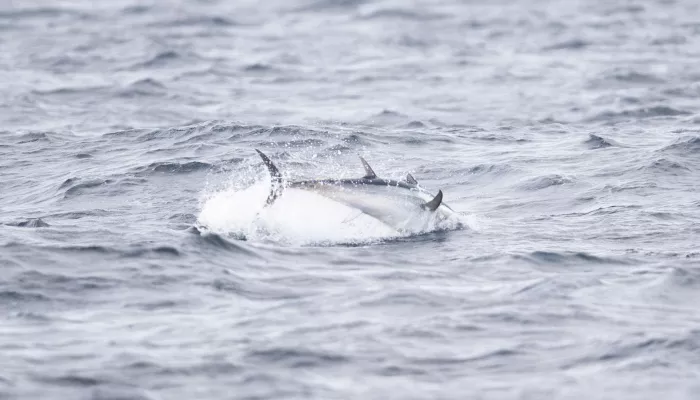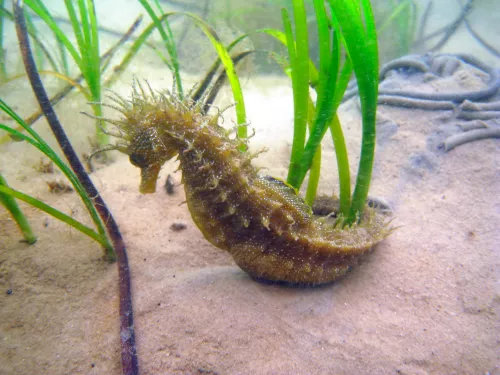Basking shark
This gentle giant is the largest shark in UK seas, reaching up to 12m in length. There's no need to fear them though, they only eat plankton!

Discover some of our fish species including sharks, rays and skates. Life under our oceans is magical so take the time to discover the species in Kent and learn about them through our guides.
This gentle giant is the largest shark in UK seas, reaching up to 12m in length. There's no need to fear them though, they only eat plankton!
Small-spotted catsharks used to be called lesser-spotted dogfish - which might be what you know them best as. It's the same shark, just a different name!
It's easy to see where the blue shark got its name from. These sleek, elegant sharks have beautiful metallic blue backs which provide brilliant camouflage out in the open ocean.
This slender and elegant shark species is often found close to shore all around our coasts and can grow up to 6 feet long.
The porbeagle shark is a member of the shark family Lamnidae, making it one of the closest living relatives of the great white shark.
This slender shark gets its name from the spines in front of its dorsal fin. It can use these spines to defend itself by curling in a bow and striking at a predator.
The nursehound is a nocturnal predator, hunting smaller fish close to the seafloor.
The thresher shark is a migratory species and passes through UK waters in the summer months. If you’re lucky, you might see this magnificent shark jump high out of the water in to the air.
The most commonly encountered ray around the British Isles, it's easy to see where the thornback ray got its name from - just check out the spines on its back!
Despite its name, the "common" skate is not so common anymore. In fact, they are Critically Endangered.
The undulate ray has beautiful wavy patterns on its back, which helps it camouflage against the sandy seabed.
It’s easy to identify this distinctive skate from the black and yellow marbled eye spots on each wing.
The spotted ray is one of the smallest species of skate, growing to only 80 cm.
This large skate has tiny, prickly spines all over its back.
The slippery butterfish is a common sight in rockpools all around the UK. Look out for the distinctive black spots on their backs that look a lot like eyes!
The shanny is a common sight in rockpools all around the UK. They are feisty little fish and have been known to bite when caught, so watch your fingers!
This clown-like fish is a favourite amongst divers and snorkellers. They are inquisitive little souls and will investigate divers near their hidey-hole homes.
This little fish is found in rockpools during the summer months and has a clever adaptation that stops it being swept away by strong waves - their pelvic fins are fused to form a sucker that it uses to cling onto rocks.
This funny-looking fish certainly won't be winning any beauty pageants, but it's a real contender for Father of the Year!
Plaice is a common sight all around our coasts - if you can spot it! They are extremely well camouflaged against the seabed and can even change colour to better match their surroundings.
Mackerel are a sign of summer's arrival, when they appear inshore in huge numbers all around the UK. As well as being a sustainable seafood choice, they are an important food source for many of our marine predators.
This brightly coloured and easily recognizable fish is one of three gurnard species found in UK seas. Collectively, gurnards are known as sea robins.
One of 2 seahorses found in UK seas, short snouted seahorses are recognisable by their shorter snout - surprisingly enough!

One of 2 seahorses found in UK seas, long snouted seahorses are recognisable by their longer snout and fleshy "mane".
Seabass is a seafood favourite, appearing on menus throughout the UK. But it's in trouble in UK seas, with much of the seabass we eat imported from European fish farms.
The black sea bream really is a fascinating fish. From sex changes to nest building, this fish is full of surprises!
Sand eels are a hugely important part of our marine ecosystem. In fact, the fledgling success of our breeding seabirds entirely depends on them.
One of the most colourful fish in UK seas, the cuckoo wrasse looks like it belongs in the tropics. Don't be fooled though, it's very much a native species.
The ocean sunfish is the second largest bony fish on the planet and visits UK seas during the summer months to feast on jellyfish.
One of the UK’s rarest marine species, this giant of the rocky shore is a very special fish.
Masters of disguise, this species exhibits one of the best examples of camouflage you will find on the seashore!
The last thing you’d expect this extraordinary creature to be is a fish!
The largest of the UK wrasse species, the ballan wrasse with its striking patterning is a delight for any rocky reef snorkeller or shallow water diver!
One of the most striking and beautiful reef species found in the UK!
Although, commonly referred to as a ‘sea snail,’ this species in fact belongs to the fish family!

One of the only venomous fish to be found in British waters, the lesser weever fish is certainly one to watch out for!
Able to camouflage itself to its surroundings, the European flounder is one of our many amazing flatfish!
This slim fish is usually found on gravelly parts of the seabed, close to shore, but can turn up in rockpools.
A small fish found on rocky shores in the south and west of Britain.